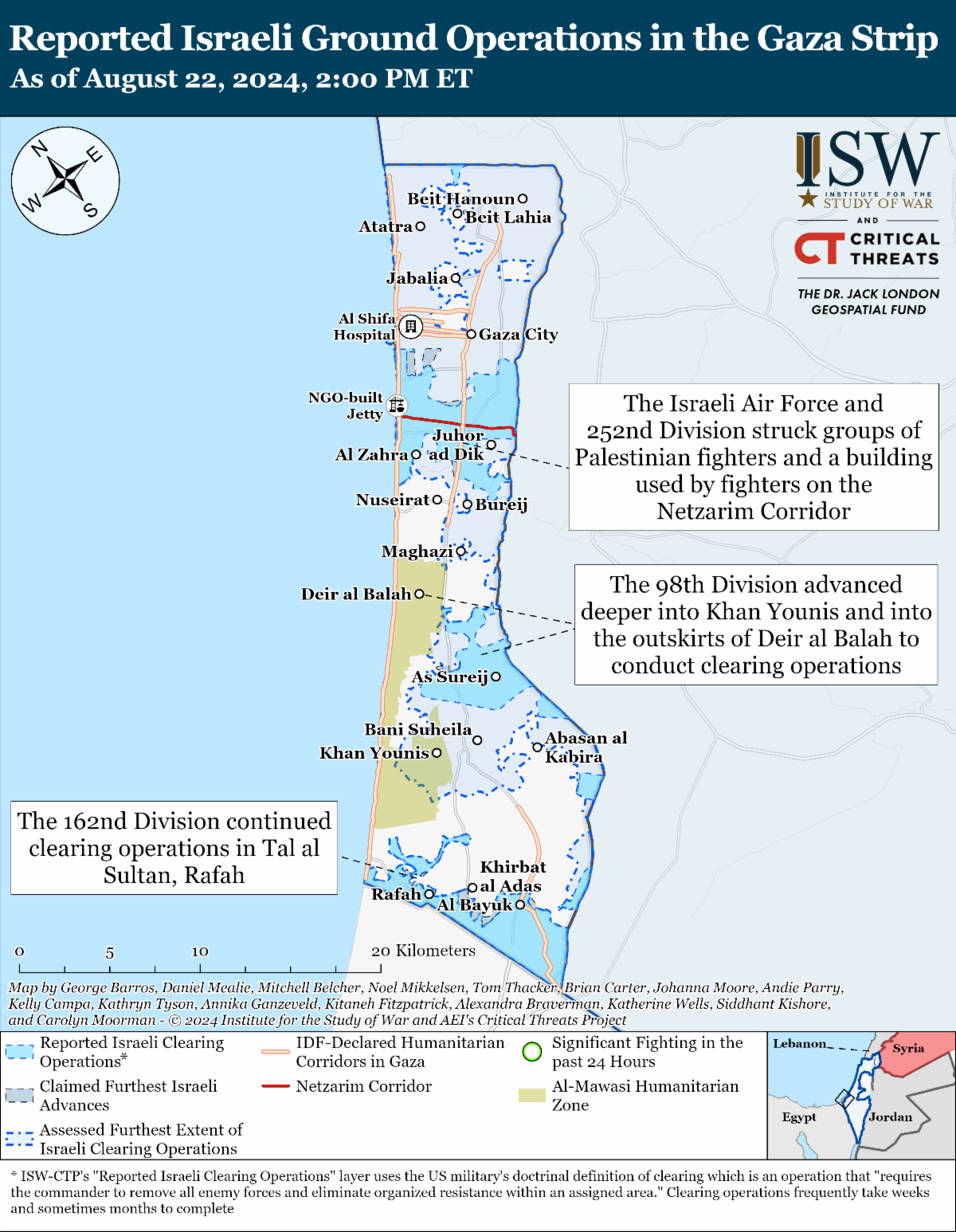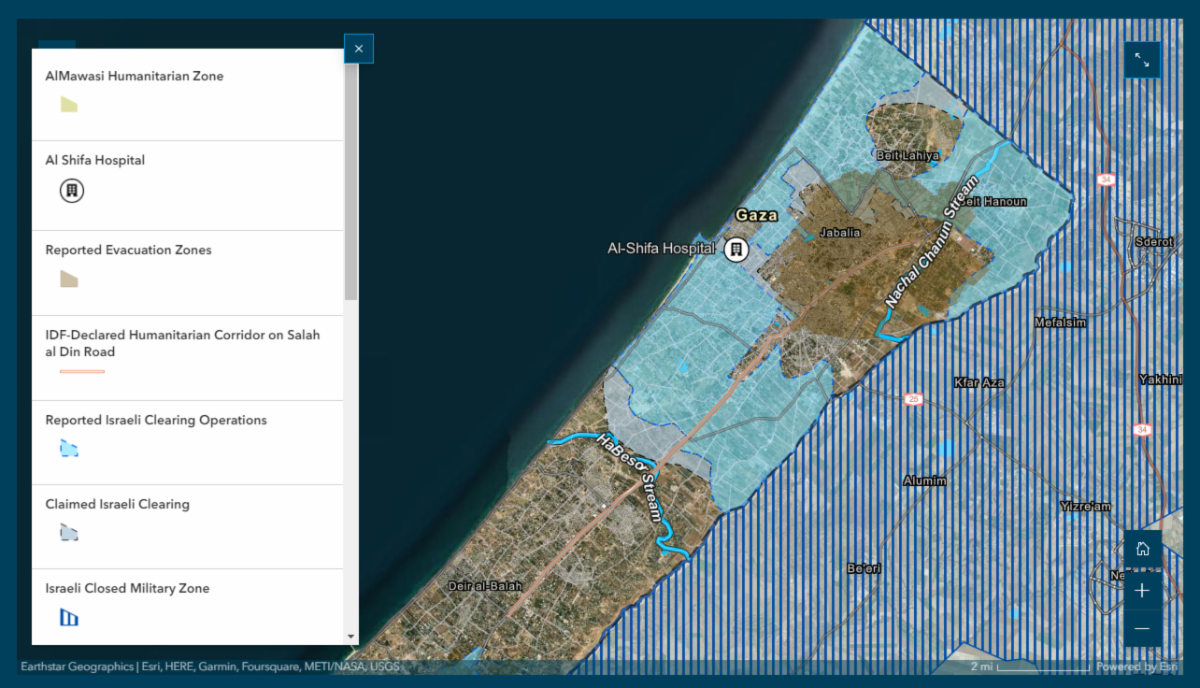Iranian interest in the progress of Gaza Strip ceasefire-hostage negotiations suggests that elements of the Iranian regime are likely delaying a retaliatory strike on Israel until ceasefire talks conclude. Islamic Revolutionary Guards Corps-affiliated Tasnim News Agency reported that newly appointed Iranian Foreign Minister Abbas Araghchi is scheduled to meet Qatari Prime Minister and Foreign Minister Sheikh Mohammed bin Abdulrahman al Thani in Tehran "in the coming days." Thani kept Iranian officials apprised of negotiation progress during the August 15-16 ceasefire talks. The timing of Thani’s visit, combined with his role as a liaison between Iran and the other negotiators, suggests that Thani is likely to discuss the ceasefire with Iranian officials during his visit. Talks between Israel and international mediators, including Qatar, restarted in Cairo on August 22 immediately before Thani’s visit to Iran. Statements from Hamas and Israel suggest that disagreements over Israeli force presence in the Strip continue to be a barrier to a ceasefire agreement, however. Unspecified Iranian officials told Western media on August 13 that Iran will "delay” its attack on Israel if Israel and Hamas conclude a ceasefire-hostage agreement. The Iranian UN mission similarly claimed on August 20 that Iran seeks to “avoid any possible adverse impact” on the ongoing ceasefire-hostage negotiations.
The Iranian security establishment may calculate that a continued delay will generate operational surprise while forgoing strategic surprise, though the continued Iranian delay has also enabled the United States to move more assets into the theater to defend against an attack. Iran has likely not retaliated against Israel up to this point because Iran very likely seeks to ensure that its next attack restores deterrence with Israel while simultaneously avoiding a large-scale war. Iranian leaders are therefore incentivized to carefully and slowly calculate their next attack to ensure that the attack inflicts serious damage on Israel but does not cause mass civilian casualties. Establishing deterrence would, however, require any retaliation to be successful. Iranian and Axis of Resistance officials have repeatedly emphasized that an attack targeting Israel will occur but have sought to counteract strategic clarity with operational ambiguity on the attack’s precise timing. US officials have warned, for example, that Iran could launch a strike with ”little or no warning.” The operational surprise that Iran is trying to build is meant to increase the likelihood that an Iranian retaliation on Israel would inflict serious damage, as CTP-ISW has previously noted.
Iranian decisionmaker’s delay has also enabled Israel and its allies to ready defenses and move additional military assets to the region, however. The Nimitz-Class carrier USS Abraham Lincoln arrived in the Middle East on August 21, enabling US forces to operate two carrier strike groups in the event of an Iranian attack on Israel.
Key Takeaways:
- Iranian Retaliation: Iranian interest in the progress of Gaza Strip ceasefire-hostage negotiations suggests that elements of the Iranian regime are likely delaying a retaliatory strike on Israel until ceasefire talks conclude. The Iranian security establishment may calculate that a continued delay will generate operational surprise while forgoing strategic surprise, though the continued Iranian delay has also enabled the United States to move more assets into the theater to defend against an attack.
- Axis of Resistance Information Efforts: Houthi supreme leader Abdulmalik al Houthi highlighted the psychological effects of delaying the retaliatory strike, which is consistent with Iranian efforts to use the delay to generate psychological effects.
- Philadelphi Corridor: Egyptian officials cited by the Wall Street Journal on August 22 said that Egypt has refused any Israeli presence on the Philadelphi Corridor, which runs along the Egypt-Gaza Strip border. The officials argued that Israel’s presence would violate the 1979 Israeli-Egyptian peace treaty and claimed that Egypt does not want to appear complicit in allowing Israeli forces to remain in the Gaza Strip.
- Red Sea: Houthi spokesperson Yahya Sarea claimed responsibility on August 22 for the August 21 attack targeting the Greek-flagged Sounion oil tanker and Panama-flagged SW North Wind I cargo ship in the Red Sea. The EU military mission in the Red Sea evacuated the Sounion’s crew and added that the Sounion is still floating but it is carrying 150,000 metric tons of crude oil and could become a ”navigational and environmental hazard.”
| 






 [ISW] 러시아의 공세 캠페인 평가, 2024년 8월 22일
[ISW] 러시아의 공세 캠페인 평가, 2024년 8월 22일
 [국방부] 국방홍보원 제작 6·25특집 다큐멘터리 「아시아의 영웅...
[국방부] 국방홍보원 제작 6·25특집 다큐멘터리 「아시아의 영웅...